Finding time for therapy used to mean rearranging your entire schedule. Now, online options let it fit into your life instead of the other way around. You can connect with a licensed professional from your couch, a coffee shop, or anywhere you feel comfortable. But as more people turn to this form of care, the number of options keeps growing — and it’s not always clear which platform fits your lifestyle.
To make it easier, we’ve rounded up the best online therapy services and highlighted what sets each apart. Whether you’re looking for insurance-friendly options, a specific type of therapy, or tools for extra support, this guide will help you quickly find a service that works for your needs and lifestyle.
Best online therapy comparison chart
| Takes insurance | Payment model | Medication management | Digital tracking tools | |
|---|---|---|---|---|
| Grow Therapy | ✓ (Accepts 100+ insurance plans) | Pay-per-session | ✓ | ✓ (Progress monitoring, AI journal) |
| Teladoc Health | ✓ | Pay-per-session | ✓ | ✗ |
| Cerebral | ✓ | Subscription | ✓ | ✗ |
| Thriveworks | ✓ | Pay-per-session | ✓ | ✓ (Mood tracking, progress monitoring) |
| MD Live | ✓ | Pay-per-session | ✓ | ✗ |
| Brightside Health | ✓ (Limited) | Subscription | ✓ | ✓ (Progress monitoring, self-guided therapy content) |
| Amwell | ✓ (Varies by state/plan) | Pay-per-session | ✓ | ✓ (Self-guided therapy content) |
| Talkiatry | ✓ (In-network only) | Pay-per-session | ✓ | ✗ |
| BetterHelp | ✗ (Potential reimbursement) | Subscription | ✗ | ✗ |
| Alma | ✓ (Limited) | Pay-per-session | ✓ (Limited) | ✗ |
| Talkspace | ✓ | Subscription | ✗ | ✗ |
| Online-Therapy.com | ✗ (Potential reimbursement) | Subscription | ✗ | ✓ (Mood tracking) |
1. Grow Therapy

Grow Therapy is an online therapy platform that makes using insurance for mental health care simple. It accepts 100+ insurance plans (including Medicare and Medicaid in select states) and shows clear, upfront rates for each provider, so you always know exactly what you’ll pay before booking. Many therapists also offer sliding scale payment options to fit different budgets.
With thousands of providers from different backgrounds, Grow Therapy makes it easy to find the right therapist. Services include individual therapy, couples counseling, and therapy for teens and children. You can filter by specialty, treatment style, demographics, and real-time availability, and choose between virtual or in-person sessions. Telehealth is available in all 50 states, while in-person care is offered in many major metro areas. Many providers also offer weekend and evening appointments, making it easier to fit therapy into your schedule.
Once you’ve found the right provider, the patient dashboard helps keep care going between sessions. You can journal, complete check-ins, and explore your therapy toolkit for more resources, all designed to help you stay engaged and track your progress over time.
Grow Therapy combines therapy, psychiatry, and medication management under one coordinated care approach. With transparent pricing and nationwide access, it makes finding the right care transparent and accessible.
Cost and insurance
- Insurance: Accepted, including Medicaid and Medicare in some states
- Cost with insurance: Starting at $0, with an average of $21 per session (varies by plan)
- Typical out-of-pocket range: $75-$250+ per session (pay-per-session, no subscription fees
Features
- Online and in-person therapy options
- Psychiatry and medication management
- Robust search and filtering tools
- Secure telehealth platform
| Pros | Cons |
|---|---|
| • Works with 100+ insurance providers, including Medicaid and Medicare | • Cash pay rates vary by provider |
| • Offers both online and in-person sessions | • In-person availability depends on location |
| • Allows you to choose from thousands of providers | |
| • Includes psychiatry and medication management | |
| • Evening and weekend appointments available |
2. Teladoc Health
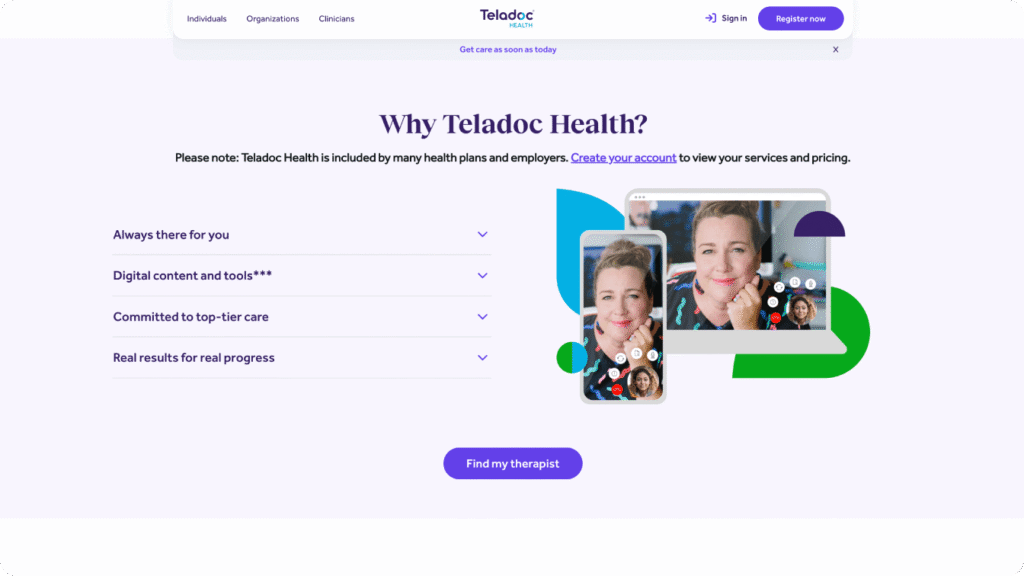
Teladoc Health is primarily a virtual primary care platform, but it also provides therapy and psychiatric services. With appointments available every day and options for phone or telehealth therapy, it fits into even the busiest schedules.
On top of therapy and psychiatry appointments, Teladoc offers digital tools to help you stay on top of your mental health between sessions. You can track your moods, work through stress, practice coping skills, and set personal goals. If you’re managing medications, psychiatry services are built in, too, so your therapy and medication care can stay coordinated.
Because Teladoc accepts a wide range of insurance plans and offers self-pay options, it can accommodate a variety of budgets and coverage situations. While sessions can be more expensive than some competitors’, many users value the combination of easy scheduling and extra digital resources.
Cost and insurance
- Insurance: Accepted
- Typical out-of-pocket range: $119 per session
Features
- Psychiatric care integrated with therapy appointments
- Appointments seven days a week, including evenings
- Digital tools and resources for extra support
- Self-pay and insurance options
| Pros | Cons |
|---|---|
| • Quick access to care without waiting for a match | • Higher session costs than some competitors |
| • Wide availability for those with busy schedules | • No in-person appointments |
| • Extra support between sessions through interactive tools |
3. Cerebral
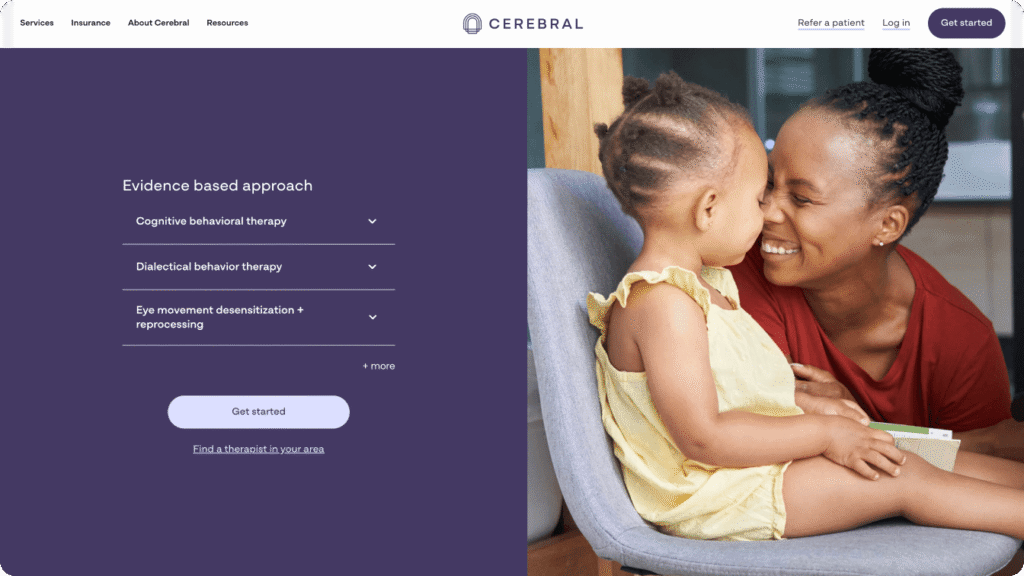
Cerebral offers evidence-based therapy and medication management in all 50 states. With over 600 trained clinicians across more than 65 specialties, they can match you with a provider who fits your specific mental health needs. First appointments are often available within 24 hours, so getting started doesn’t take weeks.
Cerebral’s providers go through training with the Cerebral Institute, its in-house research and education program. This hands-on approach helps ensure every therapist and prescriber delivers evidence-based, practical care for real-life needs.
Whether you need therapy, medication, or both, Cerebral makes it simple to get matched with the right provider and begin treatment quickly.
Cost and insurance
- Insurance: Accepted
- Typical out-of-pocket range: $30-$250 per session (varies by plan)
Features
- Evidence-based therapy approach
- Medication management services
- Tools to track moods, goals, and therapy progress
- In-app messaging with your provider
| Pros | Cons |
|---|---|
| • Large, specialized clinician network | • Medication services are not available for all age groups |
| • Can bundle therapy and medication | • Not available in every state |
| • Customized provider matching |
4. Thriveworks
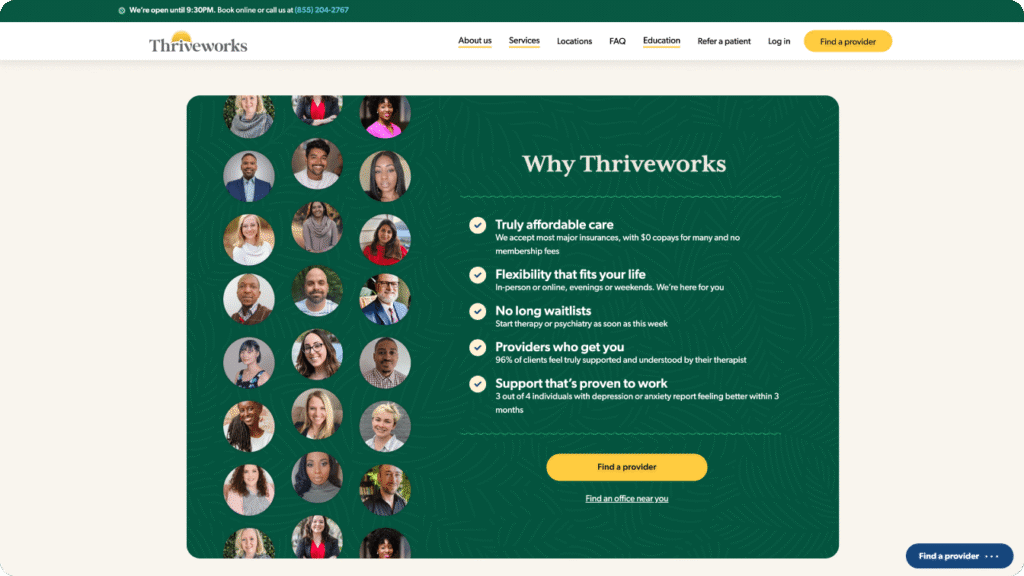
Thriveworks combines the benefits of a local clinic with the reach of a national network. With hundreds of offices and a large pool of clinicians, you can get in-person care when it works for you, plus the convenience of virtual sessions.
Families and couples may especially appreciate Thriveworks’ approach. Therapy for children, teens, and families includes parent check-ins and developmentally tailored treatment plans, helping support long-term growth and consistent progress.
For self-pay clients, rates can be higher than some online-only providers, but many users find the combination of flexible scheduling, in-person options, and continuity with a dedicated therapist worth the cost.
Cost and insurance
- Insurance: Accepted
- Typical out-of-pocket range: $160-$240 per session
Features
- In-person sessions available
- Large insurance network
- Scheduling often within three to five days for new clients
- Supports evening and weekend appointments
| Pros | Cons |
|---|---|
| • Large local presence | • Self-pay rates can be higher than many online only platforms |
| • Quick access to appointments for new clients | • Provider availability and evening slots vary by location |
| • Strong family, child, and teen therapy offerings | • Offers fewer niche therapy types compared to some specialized platforms |
| • Transparent pricing and insurance verification before booking |
5. MD Live
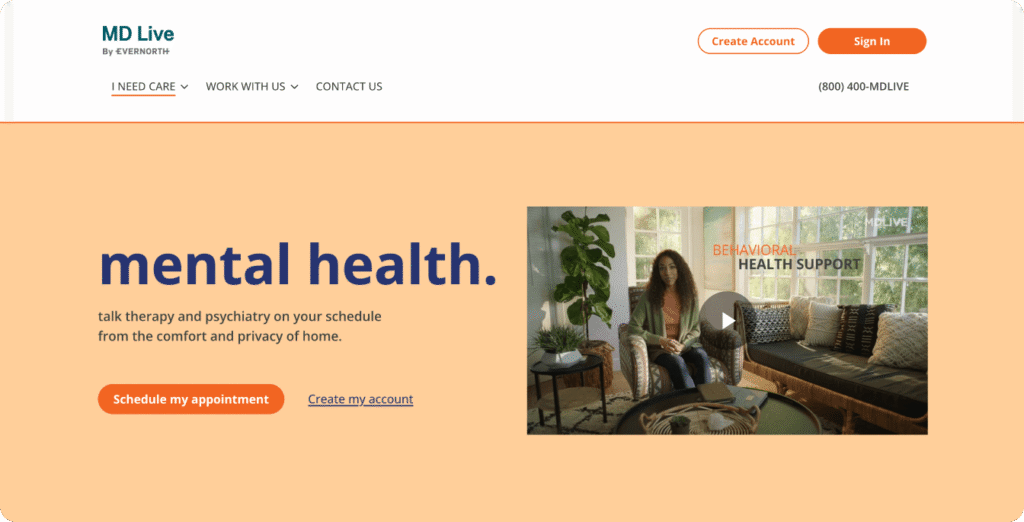
MD Live is a virtual clinic offering both mental health and general medical care online. Licensed therapists and board-certified psychiatrists are available to support common concerns like anxiety, depression, and stress, with appointments seven days a week, including evenings.
Because MD Live also serves children and teens ages 10 to 17, it’s a practical choice for families looking for a mix of convenience and clinical support. While it’s not meant for more complex or crisis-level mental health conditions, it offers reliable, insurance-friendly access to care for everyday needs.
Cost and insurance
- Insurance: Accepted
- Typical out-of-pocket range: $140-$180 per session
Features
- Access to licensed therapists and board-certified psychiatrists
- Mobile app with scheduling, messaging, and coaching tools
- Evening and weekend appointments available
- Care available for children and teens ages 10-17
| Pros | Cons |
|---|---|
| • Accepts most major insurance plans | • No in-person appointments |
| • No membership fees | • Not designed for complex mental health conditions |
| • Flexible scheduling |
6. Brightside Health
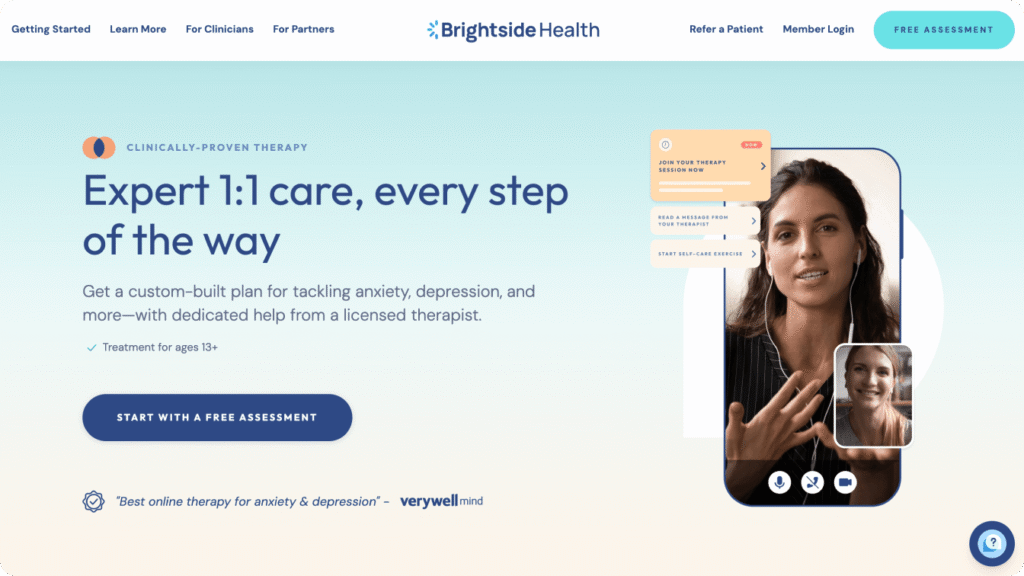
Brightside Health is a subscription-based platform that supports a broad range of mental health concerns. The platform offers therapy, psychiatry, and medication management, all coordinated through a single provider team. Brightside also provides anytime messaging, allowing you to contact your provider between sessions.
A standout feature is Brightside’s suicide prevention program, a national telehealth initiative aimed at individuals with elevated suicide risk. Based on the Collaborative Assessment and Management of Suicidality (CAMS) framework, this program offers specialized care for those who may not require emergency services but still need timely, focused support.
Brightside’s quick appointment scheduling makes it easy to start treatment without long waits, and its focus on continuity and follow-up helps ensure treatment sticks.
Cost and insurance
- Insurance: Accepted
- Typical out-of-pocket range: $299 per month
Features
- Coordinated therapy, psychiatry, and medication management
- Free assessment and personalized treatment plan
- Tools to support progress between sessions (e.g., trackers, audio lessons, and exercises)
- Suicide prevention program
| Pros | Cons |
|---|---|
| • Quick access to care without long waits | • Fully online care only |
| • Care stays connected across therapy and psychiatry | • Does not prescribe controlled substances |
| • Ongoing progress tracking |
7. Amwell
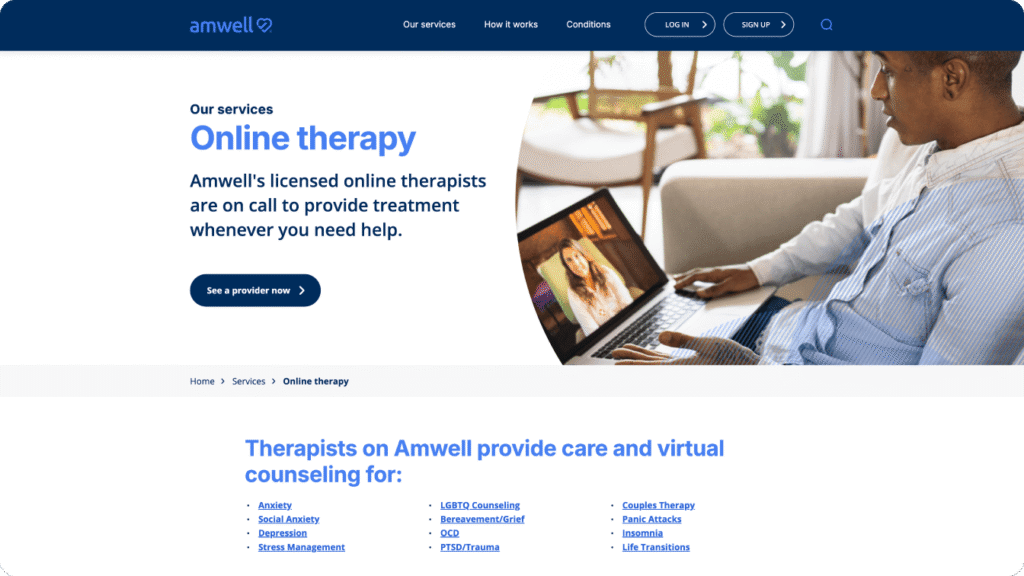
Amwell is mostly known for its virtual urgent care services, but it also offers online therapy and psychiatric services. Appointments are available via phone or video, so you can access mental health support alongside other virtual healthcare services.
One of the biggest draws is the ability to choose your own therapist. With a nationwide network of over 350 licensed psychologists, social workers, and counselors, you can find someone who fits your needs and style. Therapists are available during evenings and weekends, making it easier to fit therapy into your schedule.
Amwell is a good option for people who want to manage their mental health on their schedule, with the comfort of knowing insurance is accepted and care is available when they need it.
Cost and insurance
- Insurance: Accepted
- Typical out-of-pocket range: $109-$129 per session
Features
- Pay-per-session model
- Psychiatric appointments in addition to therapy
- Advanced data security and privacy measures
- Evening and weekend availability
| Pros | Cons |
|---|---|
| • No subscription required | • Costs can add up for frequent sessions |
| • Wide therapist network for more matching options | • Availability of preferred therapists may vary by region |
| • 24/7 psychiatric support | • Broader focus on general care means therapy options may feel less specialized |
| • Accommodating scheduling |
8. Talkiatry
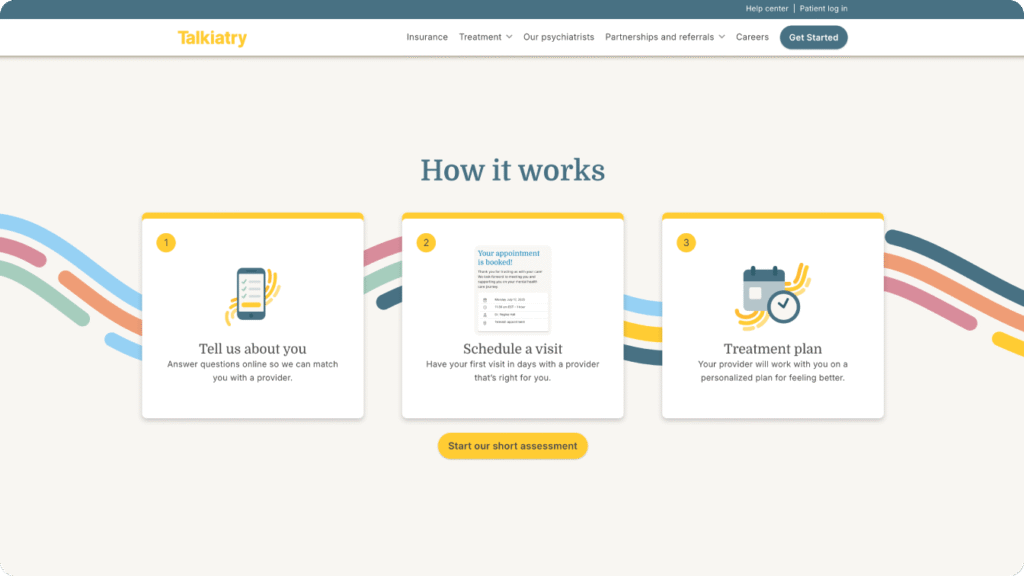
Talkiatry provides psychiatric care for a wide range of ages, with over 600 psychiatrists offering services for clients as young as 5 years old.
What makes Talkiatry unique is how it combines therapy with psychiatric evaluations. Linking therapy sessions to evaluations keeps treatment coordinated and provides a clear path from assessment to ongoing care.
All appointments are online and billed through insurance, so you can access care without traveling to a clinic. While self-pay isn’t available and services are limited to certain states, insured patients get streamlined billing and fully integrated psychiatric support, making it easier to stay on top of their mental health.
Cost and insurance
- Insurance: Accepted
- Typical out-of-pocket range: $30-$500 per session (varies by plan)
Features
- Psychiatric evaluations and medication management
- Therapy sessions following evaluation
- Available to individuals ages 5 and up
- Online appointments coordinated through insurance
| Pros | Cons |
|---|---|
| • Accepts a wide range of insurance plans | • Does not accept self-pay patients |
| • Longer session times for thorough evaluations | • Limited availability in some states |
| • Therapy sessions tied to psychiatric evaluations | • No in-person appointments |
| • Available for kids, teens, and adults | • Primarily focused on medication management rather than long-term therapy |
9. BetterHelp

BetterHelp is a subscription-based online therapy platform. You can message, call, or video chat with a licensed therapist, and unlimited messaging lets you keep the conversation going between sessions. While it doesn’t accept insurance, you may be eligible for HSA/FSA reimbursement, and some therapists may offer partial reimbursement.
The platform also includes helpful extras, like group webinars and digital tools to guide your progress. For specialized care, BetterHelp offers couples therapy through Regain and teen therapy through Teen Counseling. Instead of browsing a directory, you’re quickly matched with a therapist through a short intake process. All sessions are secure and confidential, with options for private or anonymous login.
When comparing Grow Therapy vs. BetterHelp, the biggest difference is that Grow works with insurance and offers in-person visits, while BetterHelp relies on subscription-based pricing.
Cost and insurance
- Insurance: Not accepted
- Typical out-of-pocket range: $280-$400 per month
Features
- Live chat, phone, and video sessions
- Unlimited messaging with your therapist
- Access to group webinars and digital tools
- Couples and teen therapy
| Pros | Cons |
|---|---|
| • Cancel anytime with no long-term commitment | • Insurance not accepted |
| • Multiple ways to communicate (chat, phone, video) | • Subscription-based pricing may not suit all budgets |
| • Easy to reschedule | • Services such as couples therapy and psychiatry are offered through partner sites and may be limited |
10. Alma
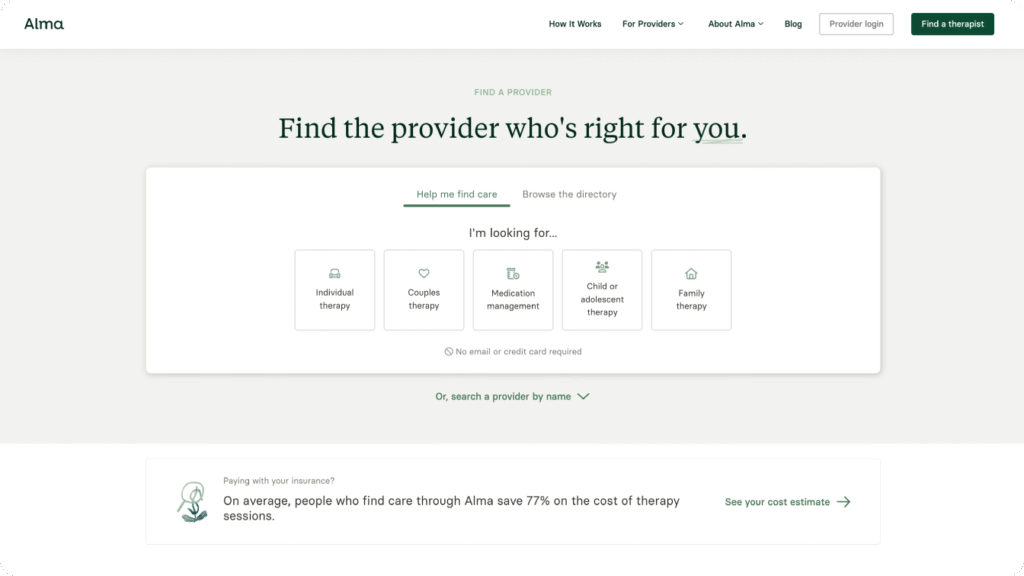
Alma helps clients connect with therapists while giving providers tools to manage their practices. Clients can use the cost estimator tool to get a clear sense of potential out-of-pocket expenses before booking a session, helping avoid surprises. Rates vary depending on the provider, location, and type of care, giving users flexibility to find a therapist that fits their budget and needs.
For therapists, Alma streamlines practice management and insurance billing with built-in recordkeeping, scheduling, and reminders. Providers also have access to a community hub and continuing education resources, keeping them supported while delivering care.
Alma works well as a way to connect with providers, though it functions more as a directory than a full-service, end-to-end therapy partner.
Cost and insurance
- Insurance: Accepted
- Typical out-of-pocket range: $130-$380 per session (varies by provider)
Features
- Cost estimator for clients
- Tools to keep therapy notes and client records organized
- Client scheduling and reminders
- Scheduling and billing support for providers
| Pros | Cons |
|---|---|
| • Upfront pricing | • Rates vary significantly by provider |
| • Built-in practice management | • Limited provider availability in some areas |
| • Secure online sessions | |
| • Supportive community and continuing education for providers |
11. Talkspace
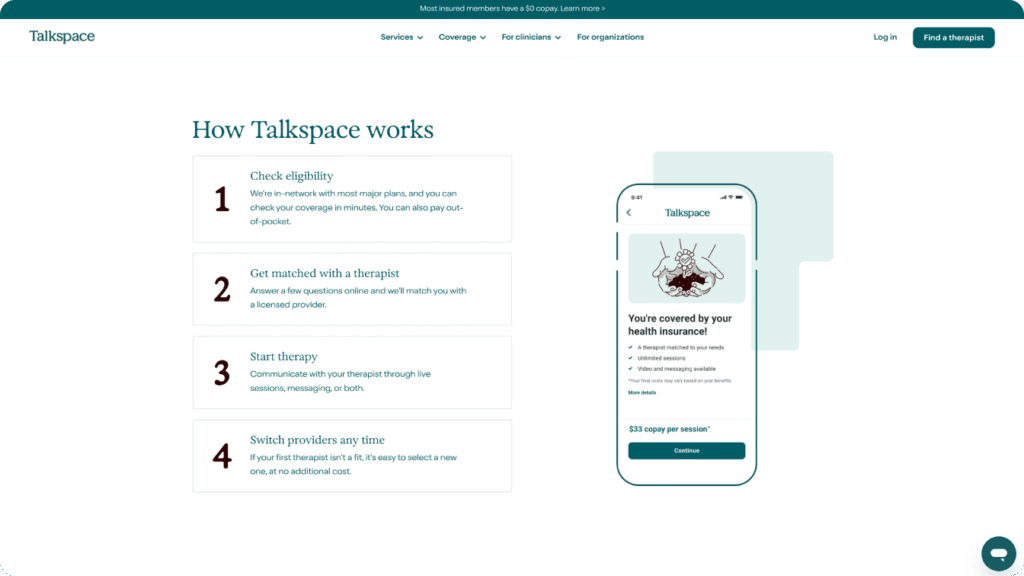
With Talkspace, therapy is centered around messaging, making it easy to check in with a licensed therapist or board-certified psychiatrist throughout the week. They also offer live video and audio sessions, giving users more traditional session options when needed. Services are available for adults, teens, and couples, with specialized programs for LGBTQIA+ individuals, veterans, and older adults.
Talkspace prioritizes ongoing communication, so you can get timely feedback without waiting for the next scheduled session. Meanwhile, digital tools, worksheets, and group webinars help you stay engaged between sessions.
Talkspace also includes medication management and psychiatric services for adults, adding an extra layer of care beyond talk therapy. With a large network of providers and multiple ways to connect, Talkspace makes it easier to maintain consistent care from home without sacrificing quality.
Cost and insurance
- Insurance: Accepted
- Typical out-of-pocket range: $276-$436 per month
Features
- Video, phone, and text-based therapy
- Unlimited messaging with your therapist
- Medication management and psychiatric support
- Couples therapy, teen therapy, and LGBTQIA+ therapy
| Pros | Cons |
|---|---|
| • Combines therapy and psychiatric support in one platform | • More expensive than other subscription-based platforms |
| • Messaging for ongoing support | • Some features limited to higher-tier plans |
| • Specialized programs for different populations | • No in-person care |
12. Online-Therapy.com
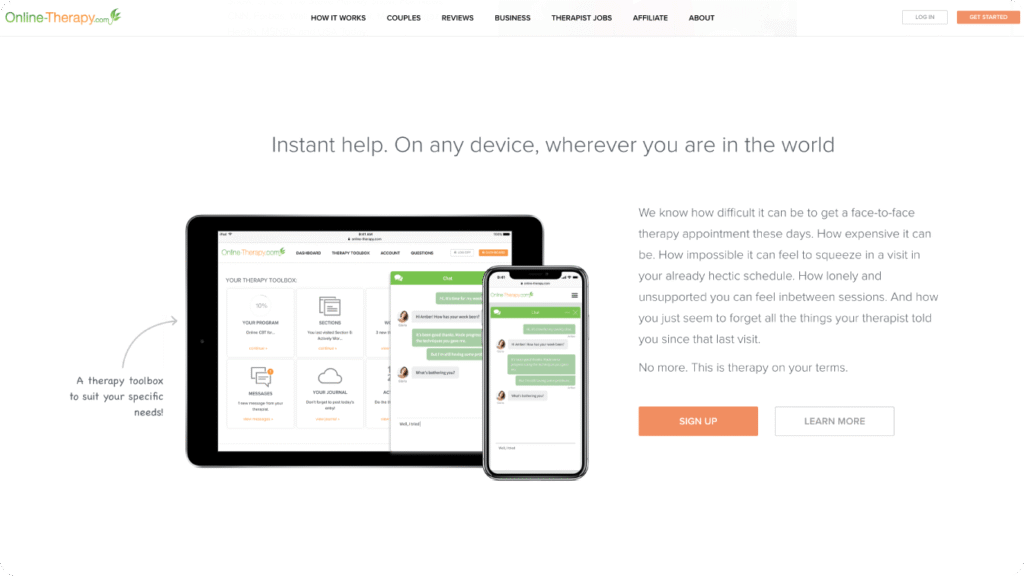
Online-Therapy.com is built around cognitive behavioral therapy (CBT), a well-researched method proven to help people change unhelpful thought patterns. The program is interactive, with worksheets, activity plans, journaling, and daily feedback from your therapist, giving you clear steps to work on your mental health.
You can stick to a lower-cost plan that relies mostly on messaging and program modules, or add one or two live sessions per week via video, voice, or text. Either way, you’ll have unlimited messaging access to your therapist Monday through Friday for ongoing guidance and support.
The trade-off is that Online-Therapy.com does not accept insurance, so costs are out of pocket. But with its built-in CBT structure and extra resources like yoga and meditation videos, many users find the value worth it.
Cost and insurance
- Insurance: Not accepted
- Typical out-of-pocket range: $160-$320 per month
Features
- Structured CBT program with interactive modules
- Worksheets, journaling, and activity plans
- Unlimited messaging support Monday-Friday
- Live sessions via video, voice, or text (depending on plan)
| Pros | Cons |
|---|---|
| • Guided program with hands-on tools | • Insurance not accepted |
| • Unlimited messaging support between sessions | • Cannot choose your therapist upfront |
| • Extras like virtual journal, yoga/meditation videos, and daily check-ins | • Basic plan has no live sessions |
Find the best online therapy for you
The best online therapy makes it easier to get the support you need without disrupting your daily life. Choosing the right provider ultimately comes down to what matters most to you, whether that’s access to psychiatry, family-friendly options, or specialized programs.
Grow Therapy connects you with licensed therapists and psychiatrists, with clear pricing and insurance options so you can find care that fits your life. Compare providers and book your first session today.
